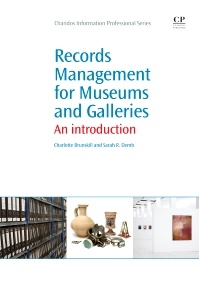Description
Records Management for Museums and Galleries
An Introduction
Chandos Information Professional Series
Authors: Brunskill Charlotte, Demb Sarah
Language: English
Subject for Records Management for Museums and Galleries:
73.94 €
In Print (Delivery period: 14 days).
Add to cart278 p. · 15.5x23.2 cm · Paperback
Description
/li>Contents
/li>Biography
/li>Comment
/li>
Records Management for Museums and Galleries offers a comprehensive overview of records management work within the heritage sector and draws on over a decade of experience in applying fundamental principles and practices to the specific circumstances of museums. It introduces readers to the institutional culture, functions, and records common to museums, and examines the legislative and regulatory environments affecting record-keeping practices. The book is comprised of eight chapters, including: a history of records keeping in the UK museum and gallery sector; the basics of records management; making a business case for records management; requirements of legislation for records management; how to conduct a records survey; strategy and action planning; how to develop a file plan, retention schedule and records management programme; and a guide to useful additional resources.
List of figures
Acronyms
Acknowledgements
Preface
About the authors
Chapter 1: The history of record keeping in the UK museum and gallery sector
Abstract:
History
Record keeping in museums: roles
Record keeping in museums: record types
Chapter 2: Records management basics
Abstract:
Introduction
What is a record?
What is records management?
The ‘difference’ between archives and records management
Basic records management concepts
Chapter 3: Making a business case for records management
Abstract:
Introduction
Compile a business case
The importance of communication
Chapter 4: Legislation and records management requirements
Abstract:
Introduction
Public Records Acts 1958 and 1967
Local government legislation
Data Protection Act 1998
Freedom of Information Act 2000
Environmental Information Regulations 2004
Other relevant legislation
Chapter 5: The records survey
Abstract
Why conduct a survey?
Pre-survey: the importance of planning
The survey: issues and tips
Post-survey: analyse, summarise and report
Chapter 6: Strategy and action planning
Abstract:
Introduction
Why to plan
How to plan
How to make the plan into a strategy
Planning for required resources
Chapter 7: Developing a file plan, retention schedule and records management programme
Abstract:
Introduction
The file plan
The records retention schedule
Implementing a records management programme
A final word
Chapter 8: Resources
UK legislation and regulations
Spoliation and repatriation
Professional bodies
Discussion lists
Useful guidance and training
Standards
Appendices: policies, forms and checklists
Appendix 1: Risk assessment template and scoring framework
Appendix 2: Business case example
Appendix 3: Sample data protection survey form
Appendix 4: Museum record series commonly containing personal data
Appendix 5: Sample data protection policies
Appendix 6: Sample data protection statements
Appendix 7: Data subject access request form
Appendix 8: Sample records management policy
Appendix 9: Museum record series commonly containing environmental information
Appendix 10: Records survey questionnaire forms
Appendix 11: Supplies checklist template
Appendix 12: Sample records transfer instruction and forms for staff
References
Index
Sarah R. Demb is the first Records Manager at the Museum of London and is also responsible for its institutional archive. Previously, she was advisor to the London Museums Hub, and held similar posts for museums at Harvard University and the Smithsonian Institution. Sarah trains, lectures and publishes on museum archive and records management, and presents regularly at conferences. She holds a Master’s degree in Library and Information Science from the University of Texas at Austin, USA.
- Gives practical and tested solutions to real world issues
- Fills a gap in the literature as a handbook in this important sector
- Provides an overview of the sector as a whole

